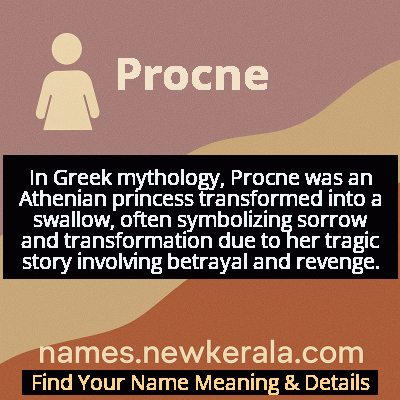Procne Name Meaning & Details
Origin, Popularity, Numerology Analysis & Name Meaning of Procne
Discover the origin, meaning, and cultural significance of the name PROCNE. Delve into its historical roots and explore the lasting impact it has had on communities and traditions.
Name
Procne
Gender
Female
Origin
Greek
Lucky Number
8
Meaning of the Name - Procne
In Greek mythology, Procne was an Athenian princess transformed into a swallow, often symbolizing sorrow and transformation due to her tragic story involving betrayal and revenge.
Procne - Complete Numerology Analysis
Your Numerology Number
Based on Pythagorean Numerology System
Ruling Planet
Saturn
Positive Nature
Ambitious, efficient, realistic, and authoritative.
Negative Traits
Materialistic, stressed, confrontational, and can be overly ambitious.
Lucky Colours
Dark blue, black.
Lucky Days
Saturday.
Lucky Stones
Blue sapphire, amethyst.
Harmony Numbers
2, 4, 6.
Best Suited Professions
Business leaders, managers, financial services, law enforcement.
What People Like About You
Leadership, determination, organizational skills.
Famous People Named Procne
Procne of Greek Mythology
Mythological Queen
Central figure in tragic myth involving transformation into a nightingale
Procne (Literary Character)
Literary Figure
Featured in Ovid's Metamorphoses and numerous classical retellings
Procne (Operatic Character)
Opera Character
Appears in various Baroque operas based on Greek mythology
Name Variations & International Equivalents
Click on blue names to explore their detailed meanings. Gray names with will be available soon.
Cultural & Historical Significance
Extended Personality Analysis
The name Procne evokes a personality marked by intense emotional depth, fierce loyalty, and transformative resilience. Those bearing this name are often perceived as possessing a complex blend of nurturing warmth and formidable strength, capable of profound love but also dramatic action when betrayed. The mythological association suggests someone with strong protective instincts, particularly toward family, and a deep sense of justice that can border on vengeance when principles are violated. Procne-inspired personalities tend to be artistic and expressive, often channeling deep emotions into creative pursuits, much like the nightingale's song representing transformed grief. They may exhibit a tendency toward introspection and possess an understanding of life's darker aspects, having either experienced significant challenges or possessing innate empathy for those who have. Their strength lies in their ability to transform adversity into growth, though they may struggle with the weight of their own intensity. In relationships, they are deeply committed but require honesty and loyalty, with betrayal being particularly devastating given their capacity for profound emotional investment.
Modern Usage & Popularity
In contemporary naming practices, Procne remains an extraordinarily rare choice, primarily confined to academic families, classical scholars, or those with particular interest in Greek mythology. The name has never appeared in official baby name rankings in English-speaking countries and maintains a status as what naming experts call an 'ultra-rare mythological name.' Its usage is complicated by both pronunciation challenges (typically PROK-nee) and the dark nature of the associated myth, which involves rape, mutilation, infanticide, and cannibalism. However, among certain circles, particularly in classical studies departments or literary families, the name enjoys a niche appeal for its historical depth and dramatic narrative power. Recent years have seen minimal increased interest as part of the broader trend toward unique mythological names, though it remains far less popular than other Greek mythological names like Athena, Persephone, or Calliope. The name's modern usage is almost exclusively as a first name rather than appearing in popular culture or commercial contexts.
Symbolic & Spiritual Meanings
Symbolically, Procne embodies the complex interplay between victimhood and agency, grief and expression, destruction and transformation. Her metamorphosis into the nightingale represents how profound suffering can be alchemized into beautiful expression, with the nightingale's song symbolizing eternal lament transformed into art. She symbolizes maternal love pushed to its most extreme expression, where protection becomes destruction and grief becomes vengeance. The name also carries connotations of voice and silence—Philomela's literal silencing contrasted with Procne's eventual transformation into a creature defined by its voice. In broader symbolic terms, Procne represents the idea that trauma can lead to unexpected metamorphosis, that victims can become agents of their own stories, and that even the most horrific experiences can give rise to new forms of expression and identity. She serves as a powerful symbol of the human capacity to transform suffering into something meaningful, however complex or troubling that transformation might be.

